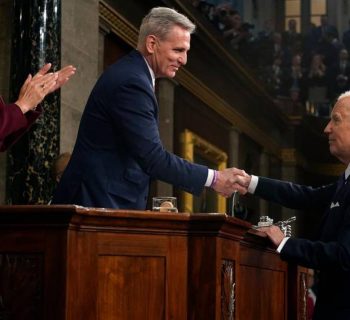By Professor Gonzalo Santos, Exclusive Op-Ed for El Magonista ~ Nov. 22, 2020
In this second commentary on the 2020 U.S. elections, I will assess the world impact it will have in the immediate, median, and long terms, with some remarks on the future of U.S.-Mexico relations. For my first commentary, where I focus on the election's domestic aspects, go here.
We must always analyze world-historic events - which Fernand Braudel dismissed, important as they may be, as "dust" in comparison with the structural evolution of the system of historical capitalism in the longue durée - in three time frames to better understand their meaning: their relationship to and impact on the moment they happen in the long life of the world-system; their relationship to and impact on the shorter cyclical patterns of the system, such as the A/B Kondratieff economic cycles of global prosperity and contraction, or the three cycles of global hegemony thus far (Dutch, British, and American) in the interstate system; and finally, the analysis of the proximate causes which gave rise to them in the conjuncture, as well as the immediate effects these events may have.
Most analysts, of course, avoid the first two levels of analysis altogether, but settle - or are confined - to (masterful or clumsy) skating in the present tense, and then mostly within the confines of their respective nation-state skate rinks. Presentism and self-absorbed national parochialism usually contribute to generating more heat than light in explaining significant events in their just dimensions - "much fluff about dust."
At the broadest level of analysis - the longue durée - everything that is happening today in the world, whether folks are willing to admit it or not, feeds into or is affected by the terminal crisis of historical capitalism, the current moment in the life of the world-system, a global social system that experienced its origin in the crisis of feudalism five or six centuries ago, evolved and survived two previous systemic ruptures (associated with the collapse of Dutch and British world orders) by qualitatively restructuring itself and expanding on a much larger scale in its economic, geopolitical, and social dimensions; and now, as the American world order has collapsed, has run out of scale, reached its asymptotic limits in its three structural dynamics, and in the absence of systemwide solutions to system-wide problems accumulated in the past 75 years, is having a catastrophic impact on the planet itself.
The world-system itself faces its imminent demise in this era of great chaos, just as feudalism reached its limits prior. Folks usually carry the conceit their own social system will live forever, until one day it collapses and is gone - as happened to the denizens of the USSR and its brand of historical socialism, or the fascist Third Reich. Americans overwhelmingly find themselves in this state of denial, despite the clear warnings everywhere.
At this level then, we can easily conclude that the United States ever-more toxic political-military dynamics and economic dislocations have added to the growing chaos of the past 40 years in international and national affairs, including the intensely polarized internal social relations everywhere. There's a reason for that. The worldwide New Deal social contract ushered in by the American liberal leadership after WW II is in fact dead. The international order it created it also dead. In fact, the United States has become the epicenter of the geopolitical retrenchment and economic and social crises we witness in the world.
The Trump regime reflects and exacerbated this trend, and although it is excellent news it was denied an even more catastrophic second term, its electoral defeat in 2020 is by no means irreversible, but may soon prove to have been only a temporary setback, especially given the strengthening of the Republican Party - now ominously consolidated around the hard right ideology of Trumpism - in both Congress and the Supreme Court.
For in the immediate horizon there is no viable ideology of systemic change from the left that has taken root yet, despite the two Sanders campaigns, and certainly a single branch of the American Duopoly in the hands of pro-systemic, centrist liberals will not stem the tide. In fact, it was their previous failures that paved the way for the rise of neofascist Trumpism.
What all this means, from the broadest analytic perspective, is that far from helping address and resolve the most pressing issues facing the world and the nation itself, the United States will continue to be a retardant at best, a major - if not the major - contributor to world chaos and conflict at worst, as the world-system agonizes.
At the lower, cyclical level of analysis, we must place the rise of Trump and neofascist Trumpism in the context of the crisis of U.S. global hegemony. Trumpism is but the logical end point of a strategic turn to the right by the leading elites of the United States as the superpower began to seriously lose the economic and geopolitical global hegemony it acquired after WW II, after the military disasters in Southeast Asia and the prolonged global economic contraction (B Phase) provoked by the Arab oil embargo of 1973.
The Reagan counterrevolution set its sights on terminating the Cold War which the U.S. itself had erected after WW II to discipline its own rebellious classes and international spheres of influence, and replacing the previous triumphant liberal ideological, economic, and geopolitical tenets of Pax Americana with more conservative ones, and in so doing, restore the United States to unquestioned supremacy.
Nixon's triumph, you will recall, had been more practical. It was to consolidate a bipolar world order with the USSR (detente), and prevent it from derailing by recognizing and bringing in China as a stabilizing force vis-a-vis the Russians and the rebellious Third World, which Nixon had no qualms in subverting via covert operations and military interventions when necessary.
But it would be much less costly to achieve the same aims by coopting both Communist powers. It did not, unfortunately for strategic thinkers, quite work to the advantage of the U.S. during the Carter era (the nuclear arms race, OPEC enrichment at the expense of the West, the earlier Soviet crushing of the Prague Spring, Iran, Nicaragua, Zimbabwe, the Russian invasion of Afghanistan). The U.S. was still losing ground. That led directly to the Reagan counterrevolution.
Reagan and Thatcher led the charge in the 1980s to discard detente, turbocharge the nuclear arms race, and accelerate the demise of the USSR, by that time an unsustainable nuclear-geopolitical superpower with economic feet of clay and an advanced loss of legitimacy in its own sphere of influence. It collapsed by its own dead weight.
Once that objective was accomplished brilliantly, without firing a shot or a missile, and while Bush I was distracted by former U.S.-propped Saddam Hussein's swallowing oil-rich Kuwait without U.S. approval, and former U.S.-propped Manuel Noriega's narcotrafficking without U.S. supervision, Clinton continued the strategic turn to the right, now focusing mostly on the economic domain.
It championed a sharp global retrenchment from, and abandonment of, the previous U.S.-led Keynesian economic world order - which had privileged the "national development" of Third World countries, based on import substitution industrialization plans, as long as they availed themselves of the Bretton Woods system of monetary management for their state-sponsored projects, controlled by the United States, and invited global (U.S.) capital to directly invest in the private sectors of their so-called "mixed economies" -, and launched a neoliberal globalization project abroad, enforced via a draconian debt regime foisted upon the very exposed "developing nations" (Mexico).
"Development" was henceforth redefined as the successful lowering of all trade and investment barriers, and the re-articulation of previously "national developmentalist" economies to a free-trade global economy regime run, of course, by and for the benefit of global capital. This in turn required the wholesale dismantling of the New Deal/Welfare State social safety nets in the nations of the Global South (and increasingly in the Global North), as the steep price to pay for access to those badly needed "structural adjustment loans."
The U.S., which controlled the world's hard currency supply, financed itself through printing and selling dollar-denominated securities to the rest of the world, accruing debt it did not have to pay, just print more Treasury bonds. There occurred, indeed, a temporary reflation of U.S. economic power and capitalist accumulation, but it accrued mostly to its wealthiest classes.
Social class tensions resurfaced everywhere in the 1990s, including the U.S., as income and wealth inequalities skyrocketed, and national populations everywhere - especially in Latin America and the former Soviet-controlled countries - became exposed to the rapacity and vicissitudes of the "magic of the marketplace." The "shock therapy" was deemed necessary to eventual prosperity in the medium term, as it was prescribed by the Washington Consensus. That medium term never materialized, and "lost decade" after "lost decade" of economic stagnation followed, while the United States managed to stave off the inevitable.
In the U.S., the political duopoly's new privatization and fiscal policies favoring the Top One Percent produced palpable dissatisfaction too, and it sparked a furious, but well-disguised, round of generalized class warfare, successfully framed - to the detriment of the Bottom Ninety Nine Percent - along the lines of the so-called culture wars and new systemic racist programs (the Wars on Drugs & Crime), as well as an assault on immigrants (the media-induced nativist hysterias and panics which quickly led to various congressionally-mandated, bipartisan-supported, border militarization boondoggle programs and the vast expansion of an "immigration enforcement" detention/deportation gulag since the mid-1990s).
Despite of these frantic domestic and international measures to restore U.S. global power, by the end of the 1990s it was clear that the U.S. had kept hemorrhaging economic and geopolitical power, mostly to East Asia, Western Europe, and various oil-rich regions of the Global South. The "indispensable nation" continued to lose ground as the "sole superpower" even as it extended its Globalization Project worldwide (hoping to ensnarl China by its accession into the World Trade Organization).
It soon became clear the U.S. was also becoming just another military giant with economic feet of clay - the U.S. went from being the largest creditor nation to the largest debtor nation. All efforts to externalize the costs of global hegemony and internalize its benefits proved insufficient. China in particular, which did not have to spend much on military budgets, roared forward in this period with sustained double-digit annual growth rates.
The dual geopolitical and economic strategies of the Reagan/BushI/Clinton eras had failed to shore up U.S. global hegemony in all but its military dimension, where indeed it reigned supreme. At most, those post-liberal, Reaganesque strategies only bought time, neutralized challenges, and postponed the demise of U.S. hegemony. The neoconservatives were waiting in the wings.
On 9/11/2001, their time came. The specter of non-state networks of terrorism materialized and achieved a spectacular, successful attack on the vital centers of U.S. power. It became easy to "scare hell" the American people again, after a decade of having no Communist boogeyman to ramp up militarism against. Enter the Bush II administration, which inaugurated an era of unilateral, aggressive militarism - sold as the "Global War on Terrorism" - to reassert U.S. power vis-a-vis all its geopolitical and economic rivals, and discipline again the domestic rebellious classes and the rebellious nations of the Global South.
Forget that the actual networks of terrorists represented a miniscule threat to the biggest military world power, the GWT worked like a charm to help turn the declining hegemon to a more imperialist, less multilateral strategy - the so-called neoconservative agenda that self-proclaimed the legitimacy of U.S. empire-building, with little or no pretense of aspiring to lead a multilateral world order for the foreseeable future. It now sought domination without hegemony.
And all this led domestically to the resurrection of big power chauvinism in the United States and the further expansion and intrusive powers of the National Security State, at the expense of U.S. citizens and immigrant communities alike.
A small price to pay to "fight terrorism," the neocons in power and its media and think tank allies pontificated. "W" strutted like a cowboy, while Cheney and company mapped out how they would reassert U.S. dominion in the Middle East and warn off China and all would be challengers. "Either you are with us or you are against us."
But after the unmitigated disasters those costly wars in Iraq and Afghanistan further indebted the U.S. to the tune of 6 trillion dollars, without even holding dominion in the quick sands of those two countries, and after the financial meltdown of 2008-10 shattered the U.S. economy (costing another 13 trillion dollars), it became clear that the era of U.S. hegemony had ended for good.
It now seemed that all previous strategic turns to the right - including its most militarist - had failed to reach the objective of shoring up and re-establishing U.S. global hegemony.
It was at the point of reaching this impasse at the end of the Bush II regime, that the decision-makers in the U.S. faced a daunting strategic dilemma: one option, in light of the now total loss of hegemony and standing in the world, was to abandon the chimera of continuing to seek "by any means necessary" its reflation of world power, accept reality and pivot back to a more liberal approach, signaling the U.S. willingness to now participate in the orderly transition to a new era of building a multipolar geopolitical world order, not always - and certainly not principally - led by the United States, or anyone else for that matter.
This strategic option, if adopted by U.S. elites unaccustomed to not running the world, would also lead the U.S. to embrace, again, an extended, more equitable multilateral economic order, as it once did when it benefitted greatly from its privileged position, but now seriously willing to addressing the needs of the increasingly rebellious countries of the Global South without necessarily excessively profiting from it as much as helping the world as a whole.
Domestically, this strategic liberal turn would seek to moderate the extreme social inequalities and inequities that had been allowed to develop and fester, and embrace a renewed, multiracial, social contract.
That was the strategy adopted in the Obama era, pursuing not so much excess profits and more geopolitical power as now seeking social peace and shared prosperity at home and world peace and shared prosperity abroad building on a multipolar, multilateral project not entirely under its control.
It was a defensive strategy in light of its precarious financial situation, and it was implemented for the following eight years after the Bush II disastrous turn to empire-building.
The other option, always preferred since Reagan, but now discredited by the Bush gun-ho years, was to double down on going into an even more rightwing direction, with even more unilateral assertions of power abroad and causing even more social polarization at home, for the benefit once again of an entrenched and reactionary American plutocracy.
The vehicle for the 2016 comeback of this right-wing doubling-down strategy, after the Obama strategy of seeking bipartisanship faltered badly, blocking most needed reforms and exacerbating tensions, was the Trump regime and the now-thoroughly Trumpist Republican Party - combining a bogus but appealing white nationalist, revanchist populism with neofascist undertones, with an aggressive rollback agenda to maximally benefit the commanding heights of U.S. capital over labor once again.
This new stage of political and social decomposition of the American internal order has led to the purposeful exacerbation of race relations, the demonization of, and renewed panic about, all Muslim and Latin American incoming or settled immigrants and refugees, and the erosion and growing suppression of civil liberties along neofascist lines.
Internationally, the abandonment of any U.S. expectations of recapturing global hegemony has now led to a full blown retrenchment into neo-mercantilism, anti-multilateralism, and reneguing of all previous international accords ("America First"), coupled with its brazen bullying of countries large (the European Union, China), medium (Canada, Mexico, Venezuela) and small (Cuba, the Central American states, Bolivia), and cuddling of authoritarian regimes (Russia, North Korea, Turkey, Brazil, the Philippines). But no new endless wars. They are too costly.
The close electoral defeat of Trump in 2020, therefore, reflects the deepest division yet within and between both ruling and working classes since the Civil War era. Both sectional, multiclass camps - the liberal Biden camp, and the ultra-rightwing Trump camp - actually grew and mobilized their highly motivated, but deeply polarized social bases for these elections. The result was an inconclusive draw in terms of the overall balance of power, with the latter camp (the Trumpists) entrenched in the U.S. Senate, significantly recovered in the House, and in total control of the Supreme Court, and the former camp (the Biden liberals) recapturing the White House.
The progressive left has been and will be for all practical purposes marginalized for the time being by the liberal establishment, but not without experiencing noticeable growth in strength and numbers in the House of Representatives, and accumulating leadership and following among the restless, ever more networked and militant social movements organizing for labor, racial, migrant, environmental, and gender justice.
Whether or not the neofascist right advances further, recaptures the House in 2022 and/or the White House in 2024, will depend largely on whether or not the liberals and the progressives forge a much more progressive and combative united front capable of confronting and defeating the now-emboldened ultra-right forces regrouping at this moment.
The prognosis in no way is bright at this time, nor the outcome guaranteed, given the secular trends in the turbulent and chaotic world-system, the irreversible collapse of U.S. hegemony, and the lack of any new world leadership capable of envisioning and executing a blueprint for the urgently needed transitioning to a new, post-capitalist world order.
The U.S. can mightily contribute if it manages its internal affairs and defeats Trumpism, but it will have to cede global leadership to a new arrangement of international actors, among which are not only other major states but the many strands of organized global civil society.
One last observation regarding U.S.-Mexico relations. Trump succeeded in subjecting Mexico and the Northern Triangle countries to the dictates of his agenda, making them behave as abject vassal states, despite the coming into office of a left-of-center regime in Mexico (AMLO/Morena).
AMLO's regime folded and caved to Trump worse than any previous president had capitulated to U.S. diktats. It was explained as some sort of T.I.N.A. - there is no alternative - especially unconvincingly and infuriatingly to the large Mexican diaspora (40 million) living in the United States.
There was an alternative, but it was never tried - to rally the Mexican people on both sides of the border to resist Trump's attacks. The reason it wasn't even contemplated was that, at bottom, the Mexican political and economic elites are still beholden to the neoliberal integration of North America, and are willing to suffer any humiliation, sacrifice and abandon its huge diaspora (not to mention transit migrants and refugees fleeing extreme violence and poverty in Central America), agree to any terms of trade and investment demanded by transnational capital, to not risk their stake in the game of continued regional capitalist accumulation at the expense of its laboring domestic and migrant classes.
Having said that, the immediate result of Trump's electoral defeat will be positive to Mexico and Central America, in relation to relaxing - though not abolishing - the draconian migration and refugee regime imposed on these countries since the 1980s, and empowering their diasporas in the U.S. to exert much more political pressure on the U.S. government and the surrendered governments of the countries to the south.
Perhaps the populations in those countries will mount their own pressure campaigns to modify the current neoliberal economic regime as well. We shall see.
But in immediate and medium terms, the efforts to create real and shared prosperity in the region through neoliberal free trade pacts like the USMC/T-MEC elite agreements will falter, not for any intrinsic flaws per se, but because, returning to the prior levels of analysis, the entire model is based in the global vitality of the U.S. economy, which, as I have insisted, is and will continue to lose ground to East Asia and Europe.
Further aggravating the situation in the foreseeable future is the political volatility and polarization of the increasingly chaotic and dysfunctional American duopoly, which can no longer be assumed will be manageable. If anything, Trump showed us is just how fragile and endangered American democracy is, and how willing the Republican elites and the deranged GOP base are to embracing a fascist, white supremacist system.
These economic and political realities reflect secular trends that will exacerbate world geopolitical and economic relations with grave consequences in the near future.
The recent pandemic, and I finish with that, has already accelerated these trends. The sole country that robustly rebounded from the pandemic by the second quarter of this year is China.

If the world economy is to somehow recover after the pandemic, it will surely be centered in East Asia, not North America nor Europe. If and when these latter regions, long accustomed to rule the world, accommodate to this emerging reality, there may be a willingness to cede leadership and cooperate to achieve tangible prosperity and world peace in the medium term, while longer term transition plans for a post-capitalist world-system are developed and implemented.
Otherwise, the systemic chaos will continue to engulf the world, most especially North America. Those in Mexico, Canada, and the United States who truly want to contribute to further regional integration, balanced prosperity and social peace, need to shed their elite parochialism and predatory behaviors, and embrace the anti-systemic social forces within the region and elsewhere in the globe now seeking to save the planet and humanity from the ravages of the presently dying capitalist Euro-American world-system, which after five centuries of plunder has no further capacity than to drag us to our universal, assured destruction.
One such social force in North America, anti-systemic by its very history of economic precarity, stigmatized social condition, and transnational character, is constituted by the migrant/ethnic Mexican and Central American diasporas and migrant flows in the United States, Mexico, and Canada. History has placed them at the very crossroads of our shared regional destiny.
The governments and elites of the countries of origin in the region, as well as the governments and elites of the countries of transit and destination, foolishly ignore, exploit, and forsake these diasporas and migrant flows at their own peril. They are, always have been, and will continue to be part of the solution, not part of the problem.
There is no "immigration problem" - except in the feverish minds of racial national chauvinists and labor exploiters - there is instead is an asymmetrical North American neoliberal, pro-corporate, anti-labor integration problem we have to uproot and supplant with a more socially benign process of continental integration.
Neither liberal nor conservative regimes in the region - and certainly not the ultra-right Trumpist regime - have been willing to face this reality. It's the neoliberal model that is the problem. Let's get over it and let's commit to rebuild the region on new foundations, with a new social contract front and center that extends social, labor, and migrant rights across borders, and adopts a more sustainable and just economic model for the road ahead.
Otherwise, the region as a whole will be left behind by those adopting such models elsewhere, from Europe to East Asia, to South America.
The 2020 elections showed the depth of the U.S. and North American impasse, and the fragility of the national and regional processes ahead.
Let no one give up an inch of terrain of contestation for our shared future - not to wishy-washy liberals, and certainly not to neofascist Trumpists.
¡Manos a la obra! ¡Aquí nadie se rinde, ni se vende, ni se va! ¡El suelo es de quien lo habita, la patria grande de quien la construye, el planeta de quien lo protege!
Shoulder to the wheel! No one here surrenders, sells out, or leaves! The land belongs to its inhabitants, the great motherland to whom builds it, the planet to whom protects it!
By Professor Gonzalo Santos, Exclusive Op-Ed for El Magonista ~ Nov. 22, 2020






